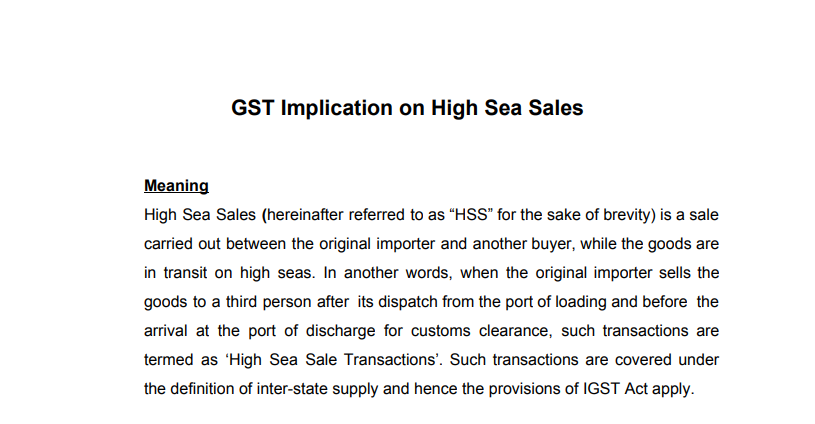GST Implication on High Sea Sales
Meaning
High Sea Sales (hereinafter referred to as “HSS” for the sake of brevity) is a sale carried out between the original importer and another buyer, while the goods are in transit on high seas. In other words, when the original importer sells the goods to a third person after its dispatch from the port of loading and before the arrival at the port of discharge for customs clearance, such transactions are termed as ‘High Sea Sale Transactions’. Such transactions are covered under the definition of inter-state supply and hence the provisions of the IGST Act apply.
Related Topic:
Bad Debts GST Implications (COVID-19)
Taxability
Goods sold on high sea sale basis not having crossed Customs Frontiers of India, are in the nature of inter-State supply as per Section 7(2) of IGST Act, 2017. The relevant provision of Section 7(2) of the IGST Act is as follows Supply of goods imported into the territory of India, till they cross the customs frontiers of India, shall be treated to be a supply of goods in the course of inter-State trade or commerce. Further Liability to tax in respect of such goods would be as per Section 5 of the IGST Act 2017 ibid, i.e., to be levied at the time of import into India only after they clear the Customs Frontier in compliance with Section 12 of Customs Act, 1962 and Section 3 of Customs Tariff Act, 1975.
Example
A person in India purchases goods from South Africa. When the shipment is in transit, he decides to sell goods to another person; such a transaction would be termed as HSS. The HSS agreement has to be done after the dispatch of goods from the origin and prior to its arrival at the destination. On conclusion of such agreement, the bill of lading should be endorsed in favor of the final buyer and the title of the goods transfers to the buyer and Bill of Entry is also filed in the name of the buyer.
Related Topic:
DISCOUNTS/INCENTIVES- GST IMPLICATIONS
No. of transactions
Further, there are no restrictions on the same goods being sold more than once on high seas. The same consignment of goods in transit can be sold multiple times before such goods cross customs frontier and enter into the territory of India.
Related Topic:
Circular-33/2017 customs: High sea sales
Time of Levy of IGST
Due to multiple transactions with the same goods, the confusion was created in the industry regarding the taxability of such transactions and question arose whether such transactions are taxable or not and if taxable, what should be value and whether IGST is to be levied at every time the HSS takes place.
In response to the same, the department issued a Circular No. 33 /2017-Cus dated 1st August 2017 and clarified that IGST on HSS transactions shall not be levied as the supply takes place before filing of Bill of Entry and such transactions are exempted from the whole of GST Act. Such transactions shall be treated as no supply (no tax payable) under Schedule III. However, IGST in case of import of goods shall be levied at the time of filing of Bill of Entry.
Related Topic:
GST Implications on Deputation and Secondment of Employees
Value on which tax shall be levied
Now the question arises on what value of HSS, the tax should be levied. A practice followed in customs is that in case the HSS transfer takes place at import invoice value only, the custom would add 2%of CIF value as HSS loading factor. There have been cases where HSS sellers have sold at less than two percent import CIF but the Custom department has added 2% of CIF as HSS value addition. Such practice of the department has been challenged because the customs duty is chargeable on the actual transaction value only.
Example
Mr. A imports goods, whose CIF value is $1000 and he decides to sell to Mr. B at $1010. However, while clearing the goods from the Customs department, the department will consider $1000*102%= $1020.
(Note: Mr. A shall need to prove that $1010 is actual transaction value and the buyer & sellers are not related party. This value is not influenced at any point)
Further, if Mr. B decides to sell these goods at $1050, the department here will not consider $1040.4 ($1020*102%) because it adds notional value @2%) IGST shall be levied at a value $1050 and that price shall be considered as the final price. Hence, IGST is levied at the time of the final transaction and at the time of filing of the bill of entry only, not every time the transaction takes places
Related Topic:
Practical Suggestions on Reply to Show Cause Notice Under GST
Documents need to be submitted
In terms of Para 2.24 of Foreign trade policy, the following documents are required to be submitted:
1. A high Seas Sales contract signed by both the buyer and seller, duly notarized. The date of contract and notarization should be before the filing of the Import General Manifest (IGM);
2. Non-negotiable copy of Bill of Lading in original, if same is not available, then photocopy of such Bill of Lading duly authenticated by Shipping Line/Steamer Agent;
3. High Seas Sale Invoice and Commercial Invoice in original or duly attested copy;
4. Authority letter for Custom Broker from High Seas Sales buyer in original (if CB is appointed) or application from High Seas Sales buyer, addressed to Deputy/Assistant Commissioner of Customs, Import Noting, JNCH
5. IEC copy of both the buyer and the seller;
Procedure to amend IGM
Import General Manifest is to be filed in the name of HSS buyer as the consignee of the goods. If it has been made in the name of the original importer/ HSS seller, then it shall be amended. To facilitate the trade and to ensure uniformity of procedure of amendment in the IGM, the following documents are required for the amendments:-
6. Request an explanation letter from Shipping Line/Agents;
7. Previous and Revised Bill of Lading (Original or Attested by the Shipping Line);
8. Request an explanation letter from Consignee;
9. A signed copy of Invoice and Packing List (Original/Attested by the Consignee/Shipping Line) (wherever required);
10. Supplier’s/Shipper’s request cum explanation letter/Load Port’s message along with manifest corrector issued by the overseas counterpart of the Shipping Line(wherever required);
11. IEC copy of the consignee/s or declaration letter in case consignee does not hold IEC (wherever required);
12. In case of change of consignee name, the following documents are also required to be submitted (as applicable) –
a) For amendment in the consignee name, where first consignee name is totally different and it doesn’t exist, it cannot be considered a typographical error, an indemnity bond duly notarised to Customs from the second consignee and a letter from Shipping Line, indemnifyingCustoms against any claim in the name of the first consignee regarding the shipment,
b) For amendment in the consignee name, where the first consignee exists, NOC from the first consignee in original is required. Since amendment in the consignee name is usually an issue of ownership of the consignment, in case the first consignee is not giving NOC for the change of consignee name, it is suggestive of a dispute between the first consignee and supplier/second consignee. In such cases, as a matter of principle, Customs has no role/interference in the ownership of the consignment, and it is an issue of civil dispute.
c) It is, therefore, clarified that in cases where the first consignee exists but has not given NOC for such amendment, the matter should be examined by AC/DC.
13. In case of change of Bill of Lading Number, the Shipping Line should submit a copy of the surrendered Master Bill of Lading and original consignee name should appear in House Bill of Lading;
14. Report from concerned Group for ascertaining revenue implication (for amendment in commodity description);
15. NOC from concerned Group in the case of Bill of Entry already filed.
No reversal of Input Tax Credit (ITC)
HSS is not exempt supply rather, HSS transaction is covered in Schedule III and is considered as NO SUPPLY. As there is no supply, GST cannot be charged on such sales, and hence there is no question of ITC relating to such transaction. In simple words, the tax has not been charged while purchasing HSS goods and therefore the tax will not be levied in HSS sales. Many people consider HSS transactions as exempt supplies and they tend to reverse the proportionate amount, which is wrong in practice.
This can be explained with an example.
As given in the above example, Mr. A sales goods to Mr. B, Mr. A will show as a sales in his books of accounts, however, he is not required to reverse common ITC with respect to such sales, as HSS is not an exempt sales. (Note: HSS is considered as no supply and hence there cannot be specific ITC i.e. ITC at the time of purchase)
The HSS should be disclosed in the following manner in various returns.
a) GSTR-1 in table 8 column 4 – Non GST supplies
b) GSTR-3B in 3.1(e) Non-GST outward supplies
Conclusion
The original importer will not charge IGST on his sale to the HSS buyer but later, the HSS buyer who files Bill of entry will pay IGST at the time of clearing goods. The person entering into HSS transactions should take care of GST law as well as the Customs Act to avoid any litigation.
Read the copy:
If you already have a premium membership, Sign In.
 Kiran Tahelani
Kiran Tahelani
GST Litigation
Ahemdabad, India
Chartered Accountant (Focused in GST Litigation)













